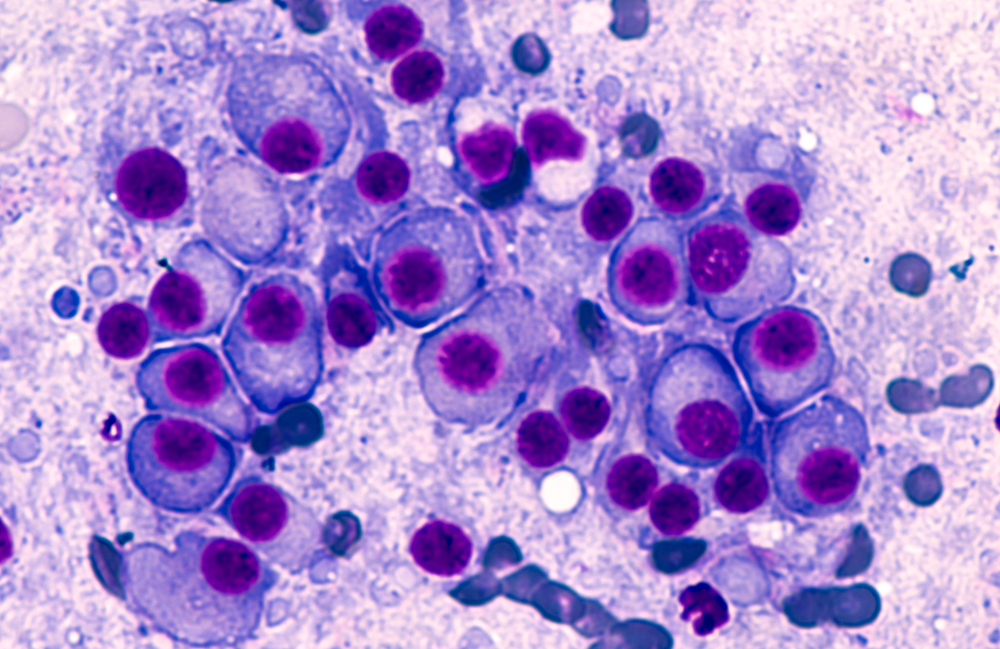-
Cancer
Mayo Clinic researchers identify gene types driving racial disparities in myeloma

ROCHESTER Minn. — Researchers at Mayo Clinic have identified three specific gene types that account for a known two-to-three-fold increase in myeloma diagnoses among African-Americans. Researchers also demonstrated the ability to study race and racial admixture more accurately using DNA analysis. The findings were published today in Blood Cancer Journal.
“Myeloma is a serious blood cancer that occurs two to three times more often in African-Americans than Caucasians,” says Vincent Rajkumar, M.D., a hematologist at Mayo Clinic and senior author of the study. “We sought to identify the mechanisms of this health disparity to help us better understand why myeloma occurs in the first place and provide insight into the best forms of therapy.”
Dr. Rajkumar and his colleagues studied 881 patients of various racial groups. Researchers found that the higher risk of myeloma known to occur in African-Americans was driven by three specific subtypes of the cancer characterized by the presence of genetic translocations in cancer cells. Translocations are genetic abnormalities in cancer cells caused by the rearrangement of parts between nonhomologous chromosomes. The translocation researchers identified were t(11;14), t(14;16), and (t14;20).
“Previous efforts to understand this disparity have relied on self-reported race rather than on genetic ancestry, which may have resulted in bias,” explains Dr. Rajkumar. “A major new aspect of this study is that we identified the ancestry of each patient through DNA sequencing, which allowed us to determine ancestry more accurately.”
Dr. Rajkumar says the probability of an individual having one of the three specific translocations responsible for myeloma was significantly higher in the 120 patients who researchers identified with the highest level of African ancestry compared to the 235 individuals identified with lowest level of African ancestry.
“There are efforts to enroll more minorities in clinical studies, and this is important,” says Dr. Rajkumar. “However, it is equally, if not more important, to determine the mechanisms of racial disparities in terms of why cancers occur more often in certain racial groups. Our findings provide important information that will help us determine the mechanism by which myeloma is more common in African-Americans, as well as help us in our quest to find out what causes myeloma in the first place.”
Dr. Rajkumar says study results also are important because response to cancer treatments vary based on the genetic subtype of cancer, and these findings will help researchers develop more effective treatment strategies for African-Americans with myeloma.
Co-authors include
- Linda Baughn, Ph.D, Mayo Clinic
- Mei-Yin Polley, Ph.D., Mayo Clinic
- Yan Asmann, Ph.D. Mayo Clinic
- Terry Therneau, Ph.D., Mayo Clinic
- James R. Cerhan, M.D., Ph.D., Mayo Clinic
- Celine M. Vachon, Ph.D., Mayo Clinic
- Keith Stewart, M.B., Ch.B., Mayo Clinic
- Leif Bergsagel, M.D., Mayo Clinic
- Angela Dispenzieri, M.D., Mayo Clinic
- Shaji Kumar, M.D., Mayo Clinic
- Eran Elhaik, Ph.D., University of Sheffield, Sheffield, UK.
- Michael Baird, Ph.D., DNA Diagnostics Center, Fairfield, OH
###
About Mayo Clinic Cancer Center
As a leading institution funded by the National Cancer Institute, Mayo Clinic Cancer Center conducts basic, clinical and population science research, translating discoveries into improved methods for prevention, diagnosis, prognosis and therapy. For information on cancer clinical trials, call the Clinical Trials Referral Office at 1-855-776-0015 (toll-free).
About Mayo Clinic
Mayo Clinic is a nonprofit organization committed to clinical practice, education and research, providing expert, comprehensive care to everyone who needs healing. Learn more about Mayo Clinic. Visit the Mayo Clinic News Network.
Media contact:
- Joe Dangor, Mayo Clinic Public Affairs, 507-284-5005, newsbureau@mayo.edu







